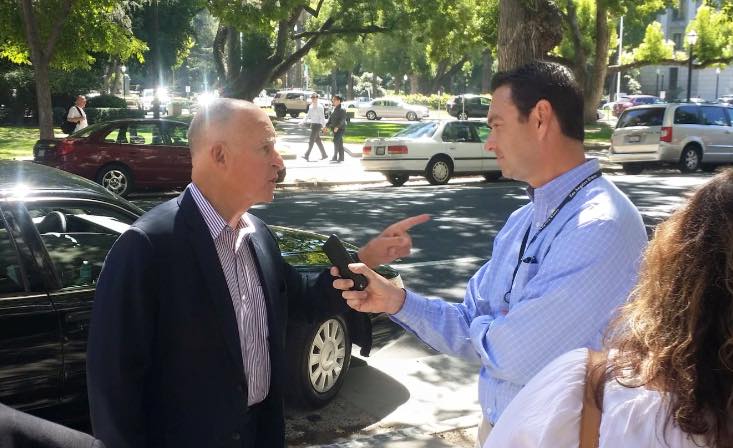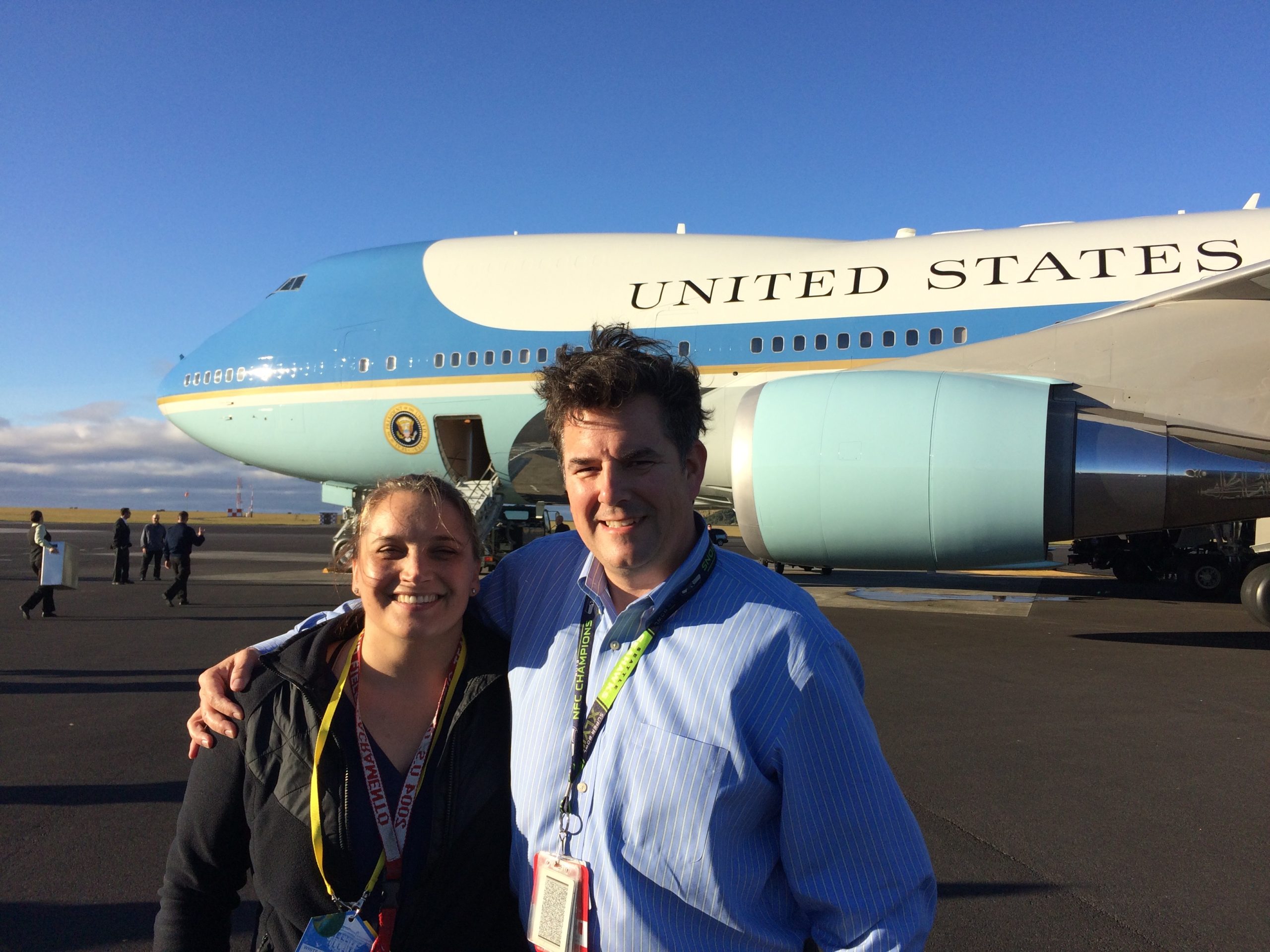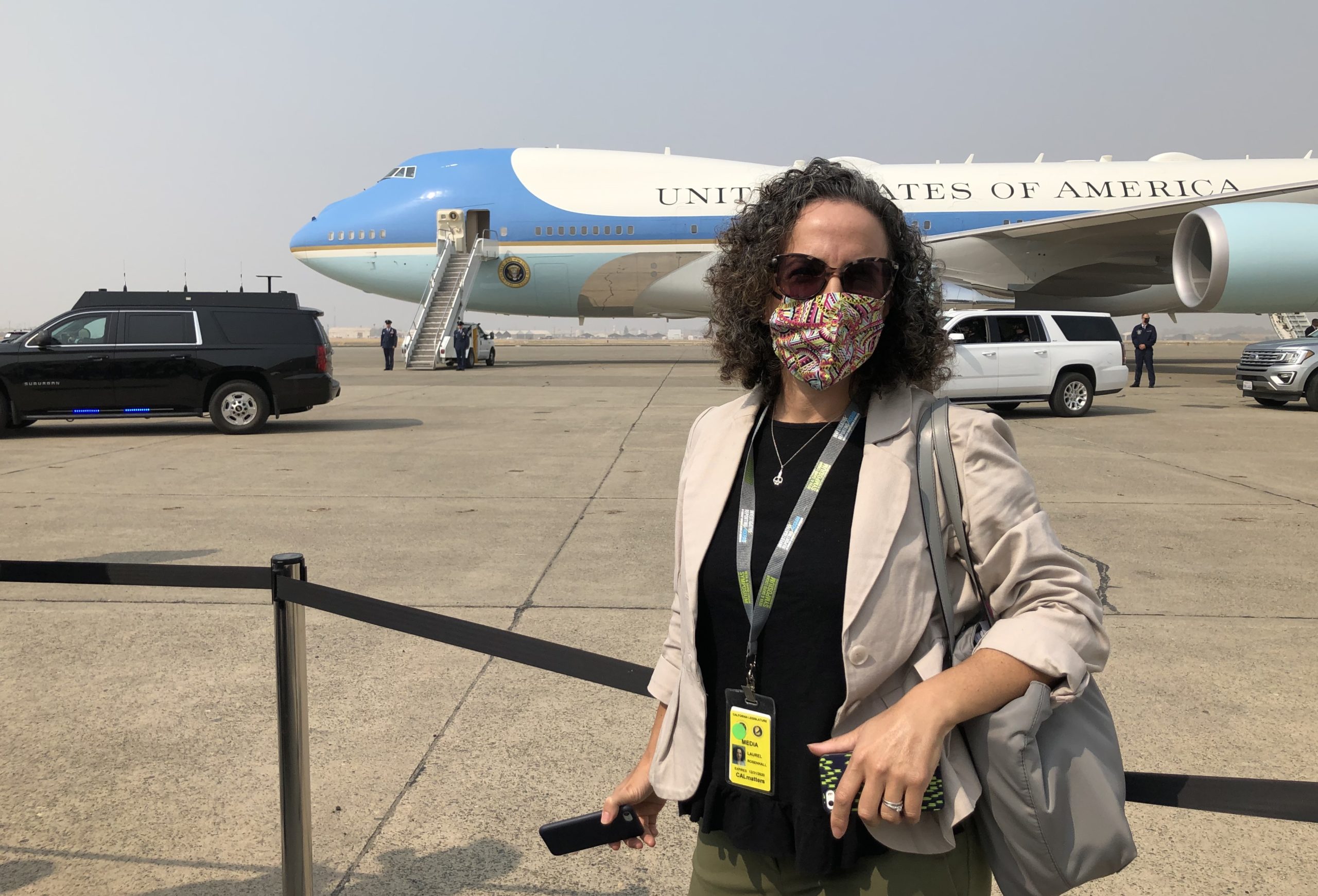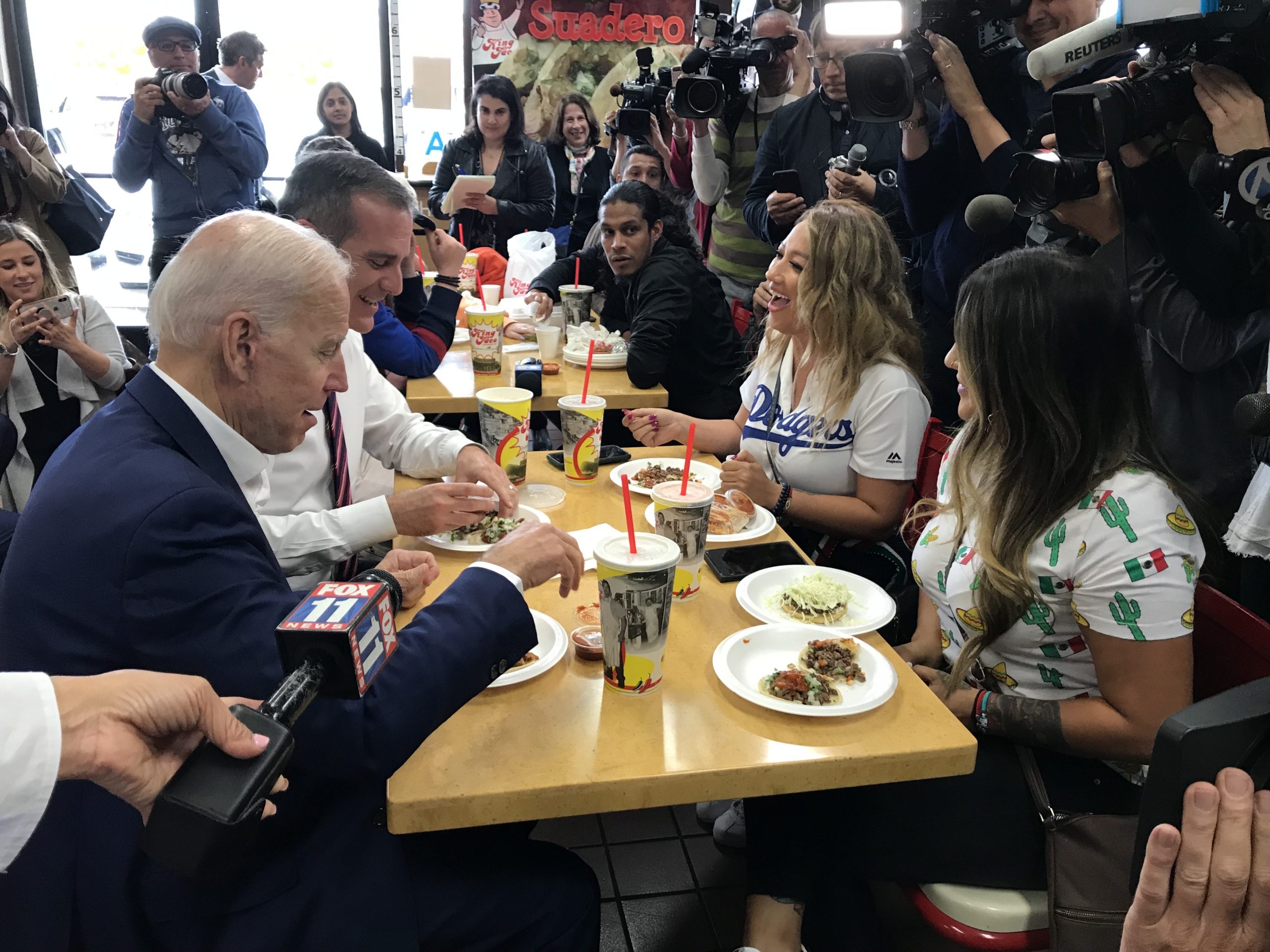Every four years, voices in the political industrial complex proclaim the upcoming presidential election the most important of our lives — perhaps even the most important since some long-ago marker like the Civil War. Each election, we’re told, is a fight for the very soul of America!
This year is certainly no different, but what is different is the fever-pitch level of rancor, the degree to which facts have become a partisan litmus test, a pandemic testing our voting system, and a president unwilling to commit to a peaceful transition of power should he lose.
At the front lines of all the head-spinning headlines are journalists, including many Berkeley Journalism alumni in print, television, radio, and more, covering the action at the regional, state, and national levels. To understand the pressures and potential outcomes of this — dare we say it — unprecedented election season, we caught up with four alums (when they could come up for air).

John Myers: “A fun moment where Jerry Brown didn’t like my Q. He is a stickler for the framing, even the syntax, of a reporter’s question.”
John Myers (’95)
Sacramento Bureau Chief, Los Angeles Times
This is clearly an unprecedented time in U.S. politics in an era when the truth itself seems to be on trial. What is it like for you personally reporting now?
It’s probably the most challenging time in my 26-year career. The stakes feel higher and the vitriol directed toward mainstream news is more intense. Our role as journalists no longer requires us to simply be a fair arbiter of events and information but now demands a more active, call-everyone-out participant. We’ve had to transition from being a dispassionate observer to a human lie-detector test. I’m happy to embrace that role, but I also worry that it’s an impossible standard.
As a follow-up: Joe Pompeo recently published a rather nightmare-inducing story in Vanity Fair quoting major news figures saying things like, “It’s gonna make 2000 look like an election for high school class president,” as well as, “Remember hanging chads? Oh my God, that’s Play-Doh!” and also, “the most challenging situation would be that it takes a while for the real results to be known, and people jump to conspiracy conclusions during that period. That to me is the worst-case scenario.” What’s your best estimate as to how this will play out?
The threshold question is whether the presidential election is a blowout or a nail-biter, and I can’t fairly guess that one from my role as a California politics-focused journalist. But I feel confident saying that a nail-biter is an election that will test the very foundations of the American democratic process. Voting systems, at the end of the day, are prone to human error. But the partisan warriors are poised to attack mistakes as intentional — and that changes the dynamic in ways people won’t easily forget once the election is over.
Stepping back, what’s your most memorable interview of a politician and why?
Fall of 2005. I was interviewing then-Gov. Arnold Schwarzenegger and was trying to pin him down about some of the likely unintended consequences of a state budget-balancing measure he was championing during a statewide special election. He dodged and dodged, over and again, the key question I was asking him. At the time, I was a public radio reporter and my editor and I tried something unusual: we made the story all about how he refused to answer the question. We didn’t simply try to find some kind of palatable answer — we made it clear what really happened. It was a liberating moment for me, to make clear that nowhere in his response was an actual answer.
What made you want to cover politics and what would you tell a current Berkeley student considering it to expect?
I always loved politics, an attraction that began long before I walked through the doors of North Gate Hall in the summer of 1993. But the real answer is that it was my mentor, the late Susan Rasky, who made me realize how amazing it can be to write about the drama, the bluster, the high stakes that come with politics. Susan’s political reporting class was like nothing else and she has remained my North Star in this business all these years later.

Jon Garcia standing on a tarmac in the Azores on President Obama’s last foreign trip November 2016. They were on their way from Europe to Lima, Peru for his last APEC Summit meeting. Pictured with Margaret Talev, then-Chief White House Correspondent for Bloomberg News, now the Politics and White House Editor for Axios.
Jon Garcia (’97)
White House producer, ABC News
What is it like for you personally reporting now?
It’s tough. It’s much harder than it was under previous administrations — and at that time we thought it was difficult to break through the spin. Breaking through the spin now is much tougher. Our reporters, on air and off air, have developed great sources, but in the Trump White House, even great sources have limitations because their information is only as good as Trump’s latest thinking or desire. As far as the truth is concerned, a journalist’s job is to call out any administration official who tells outright falsehoods or egregiously omits facts or takes any comment out of context so as to change its true meaning. But it’s infinitely harder to do that in real time when it happens so frequently, so quickly that you don’t have the time on TV or the space in print to cover it all before you’re on to the next thing. It’s like trying to drink from a firehose. And to be clear, while I’m talking about the Trump White House now, this will apply to a degree to a Biden White House too. The Biden campaign has done some of its own selective omission of facts and hardcore spin too.
In my current job as a producer, much of what I deal with is almost always off the record and for planning purposes only (OTR/FPPO, is the acronym we use), so I tend to get more facts about logistics, planning and execution of presidential events and movements. There’s not that much spin for me directly, but the on-again, off-again, change-again nature of this president often makes me feel like I’m on a hamster wheel. And, at least to the TV networks and sometimes to the taxpayers, it often costs a lot of money in cancelled or changed event sites, airline tickets for staffers, media and secret service, hotels and fees for vendors on everything from chairs and tables to risers and generators.
What’s your best estimate as to how this will play out?
I’m not clairvoyant and, after 2016, making predictions is dangerous. But Trump’s near-constant tweeting about possible mail-in balloting fraud, the logistics and timing of counting mail-in ballots on a massive scale and the rules for challenging mail-in ballots, makes any outcome that isn’t a 1984-style blowout a big question mark. I think it will be tight, as do many of my colleagues. No one wants to or should underestimate Trump’s popularity in the right states. He may not win the popular vote (he didn’t in 2016), but all he needs to do is win the right states to keep his office. There’s some debate about the most important state in this calculation. I think it’s Pennsylvania, but others think it’s Florida. The polls are tight in both those states.
What’s your most memorable interview of a politician and why?
George H.W. Bush. I helped produce an interview with 41 after he wrote a book about all the letters he’d sent and received over his lifetime. It was memorable because it was the first time I’d seen a president cry during an interview. He was talking about the death of his first born, Robin, who died of leukemia when she was three years old. As he read a letter he wrote to his mother about the agonizing loss, tears were coming down his face. You could see and hear the pain he was still feeling 70-plus years later. We get so used to seeing politicians on message and managed by the staff and spin machines they build around themselves, we often forget they have a personal journey filled with joy and pain just like everyone else. (For the record, Sam Donaldson asked the questions and chose the letters he wanted Bush to read, and I suspect he chose that letter with purpose.)
What made you want to cover politics and what would you tell a current Berkeley student considering it to expect?
I was always interested in politics because my parents were interested in it. They didn’t work in politics but both felt it was important to be informed, understand the world around you and vote. I was raised with parents who read the newspaper daily and watched national and local news almost every night. When I got to college, I covered student elections for the university paper and then got a job at the LA Times covering, among other things, local city councils and elections.
If you want to start covering politics, you should expect the unexpected. Never take anything at face value and assume everyone you cover has an agenda that you may not know about. It really does get tiring, listening to the same speeches and spin over and over again. But it’s vital for reporters to continue to pay attention. That’s the job. And one thing you should never forget is that politicians are people. They have strengths and weaknesses, good days and bad. And most of them get into politics to make a difference in their community, state and country. Most politicians see themselves as public servants, serving a noble cause. That may be true but it’s almost never exclusively that. Reporters need to keep paying attention, asking questions and exposing conflicts. That will help keep politicians as public servants and minimize corruption.

Laurel Rosenhall on the tarmac at McClellan Park in Sacramento during President Trump’s visit to Sacramento on Sept. 14, 2020. Photo: Taryn Luna.
Laurel Rosenhall (’02)
Political reporter, CalMatters
What is it like for you personally reporting now?
At CalMatters, we focus on California state politics and policy. So election years for us are about tracking money in state politics and explaining the choices voters face on California ballot measures and state-level offices. The presidential race is not our main focus, though we do look for stories that show how California is shaping the presidential election — such as this piece on how the Democratic ticket hopes to make the U.S. more like California, or this one on how President Trump casts California as a cautionary tale of Democratic rule.
Like many people, I’ve been largely working at home since the middle of March. I have gone out on assignment a few times — including to cover Trump’s visit to California to meet with Gov. Gavin Newsom about wildfires — but for the most part I am working from home, analyzing campaign finance reports, doing interviews by phone, participating in video press conferences and recording media appearances on Zoom. I definitely miss my usual in-person reporting!
What’s your best estimate as to how this will play out?
California, as an overwhelmingly blue state, is not in play for the presidential race. But a lot of the changes that other states will experience this November have already been in place in California for some time. Voting by mail has been popular in California for many years — in this year’s pre-pandemic primary, nearly three-quarters of California voters got a ballot in the mail. And Californians have become accustomed to waiting days, or sometimes weeks, to learn the final results of tight races, in part because state law allows ballots to be counted after election day, as long as they are postmarked by election day. Though California reporters get antsy in the days following an election, candidates and political professionals here have overwhelmingly projected patience and respect for the (super slow) process. I don’t expect that to change enormously in California this year, but in swing states it could be a very different story.
What’s your most memorable interview of a politician and why?
The times when I connected with a politician outside of their office or scripted campaign event, and just took a walk with them in their own community, are what really stick out. It’s so helpful to see where they come from and what they’re like without all the trappings of power.
But overall I would say my most memorable interviews have not been with politicians. Interviews with ordinary people whose lives intersect with a politician tend to be more illuminating and less predictable. The woman whose mentally-ill sister was shot and injured by San Francisco police — and then prosecuted by then-District Attorney Kamala Harris. The small-town fire chief who voted against Democratic Gov. Jerry Brown his whole life, but befriended him as the governor built a retirement home in a rural, largely-Republican region. The many political staffers and lobbyists who trusted me with their stories about nepotism and sexual misconduct in the statehouse. These views give us insights about people in power that we can’t get from politicians themselves.
What made you want to cover politics and what would you tell a current Berkeley student considering it to expect?
I got into political reporting because of my interest in accountability journalism, so a lot of my work has focused on campaign finance, lobbying and how interest groups work to influence California politicians and voters. But politics is a rich beat, and I’m always looking for ways to cover it that serve the public interest. What to expect: A lot of intense personalities. A media landscape that is in flux. The weight of responsibility to get things right. Opportunities to learn new things all the time. The feeling, every so often, that you have a front seat to history.

VP Joe Biden and Eric Garcetti make a campaign stop at King Taco in Los Angeles in May 2019. Melanie Mason is in the center, wearing a leather jacket (Photo: Mike Memoli / NBC News)
Melanie Mason (’10)
Political reporter, Los Angeles Times
What is it like for you personally reporting now?
It’s a deeply odd time to be a political reporter. I’ve just started reporting out in the field again, which I was desperately missing during the early months of the pandemic. Being out on the ground helps counteract some of the nastiness on social media and in my email inbox. I find that while people are absolutely skeptical of the press, particularly Trump supporters, folks are generally open and kind to reporters in person, regardless of their ideology. And in some way, I find people are more likely to want to talk and have in-depth conversations these days — probably because of the social isolation of the pandemic.
What’s your best estimate as to how this will play out?
I know it’s a cop out, but I am absolutely making zero predictions of how election night will play out — in part because 2016 taught us that predictions can really lead us astray and also because I think it’s better to be prepared for all contingencies. My colleagues and I are preparing to know the election laws in key battleground states, so we’ll be well-versed for potential legal challenges. I think it’s equally possible that there’s a quick election-night call or that there’s a protracted battle. But let me put it this way: I’ve purposefully kept my schedule open for the entire month of November, just in case.
What’s your most memorable interview of a politician and why?
I’ll cheat and name two. The first was last year with Sen. Kamala Harris, about her maternal grandparents from India. I covered Harris’ primary campaign and even back in her attorney general days, so I feel like I know a lot about her and I know when she’s falling back onto talking points that I’ve heard many times before. The interview about her grandparents, and especially her grandfather, truly taught me something new about her.
Also memorable were the interviews that I did with politicians who were accused of sexual harassment and misconduct at the height of the MeToo movement in 2017. I was covering the California state Capitol at the time, and those were high-pressure interviews requiring precision and firmness. My goal was to be thorough enough that no one could accuse me of unfair or gotcha journalism. I’d like to think I accomplished that.
What made you want to cover politics and what would you tell a current Berkeley student considering it to expect?
I fell into politics somewhat accidentally — I applied to every internship in the world during grad school and Politico was the one that hired me. That set me on a course to get more political reporting jobs. That said, I’m thrilled that this is where my career has found me. Politics isn’t just horse race — in fact, the horserace is the least of it. Politics is how people experience and perceive the most important issues: the economy, healthcare, safety, justice, etc., etc. And as a journalist, political reporting has let me tackle every aspect of the work, from long features to investigations to breaking news. I’d tell current Berkeley students to be prepared to be utility players, ready to tackle various types of assignments and endless topics. If you like being a perpetual student, like I do, then it is the ideal beat.
–Sam Goldman (’19) and Marlena Telvick
